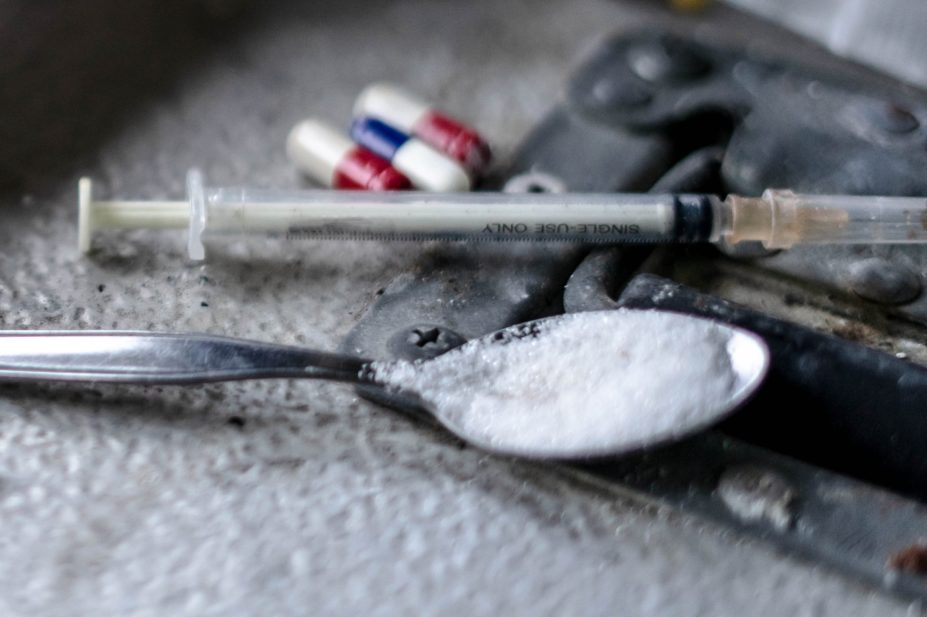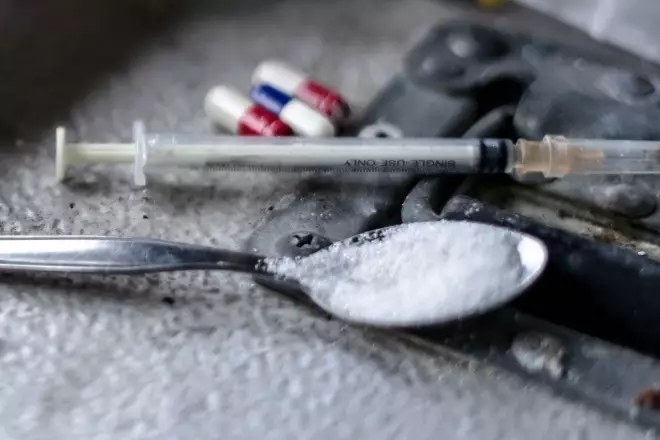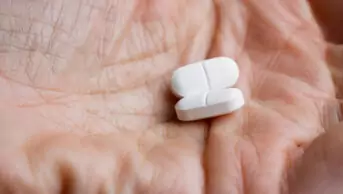
Shutterstock.com
Open access article
The Royal Pharmaceutical Society has made this article free to access in order to help healthcare professionals stay informed about an issue of national importance.
To learn more about coronavirus, please visit: https://www.rpharms.com/resources/pharmacy-guides/wuhan-novel-coronavirus

Source: Shutterstock.com
People who use illicit drugs are particularly susceptible to COVID-19, as the pandemic not only poses a risk to their health, but the services available to them too
In March 2020, as fear of the COVID-19 pandemic began to grow in the UK, people began to panic-buy: they emptied supermarket shelves of essential items, and over-bought and over-requested medicines, leading to shortages.
And now, people who use drugs (PWUD) may be panic-buying, stockpiling and facing shortages of their own essentials. By mid-April 2020, drug experts had raised their concerns about the dip in supply of illicit drugs, such as heroin and the synthetic cannabinoid spice[1]
,[2]
.
Many groups vulnerable to COVID-19, such as those aged 70 years and over and those with chronic health problems, have been offered assistance during the lockdown — for example, those who are shielding are being offered help with food and medicines deliveries. But extra measures must also be taken to protect PWUD, since their health status, needs and behaviours put them at an increased risk of COVID-19, and since the disruption to their vital drug services could also make a stark impact on their mental and physical wellbeing.
To this end, the European Monitoring Centre for Drugs and Drug Addiction (EMCDDA), which helps policymakers understand and respond to trends in drug use in Europe, quickly reacted to the pandemic and, on 25 March 2020, issued a briefing on how COVID-19 will affect PWUD and the services they use, to “encourage planning, review and adaption of frontline and specialist drug interventions”[3]
.
People who use drugs left vulnerable to COVID-19 without drug support will face fatal consequences
England’s PWUD response did not come until later, on 15 April 2020, when the Department of Health and Social Care (DHSC) and Public Health England (PHE) issued its guidance for commissioners and providers of services for people who use drugs or alcohol[4]
. In the UK, we must consider how our PWUD will be affected by the pandemic and heed the government’s advice, and that of the EMCDDA — PWUD left vulnerable to COVID-19 without drug support will face fatal consequences.
Vulnerability to COVID-19
Predisposed to infection
People with chronic health problems are at greater risk of COVID-19; this group may include PWUD, who often have declining mental and physical health. Older PWUD also often have comorbidities[5],[6]
.
Drug use itself can compromise health. People who use heroin, crack cocaine and those who smoke tobacco are considered to be at increased risk of respiratory illness[7]
. Users of psychostimulants, which are vasoconstrictive, such as methamphetamine, are at increased risk of pulmonary failure[3]
. Those who inject drugs and/or use cocaine are at increased risk of cardiotoxicity[8]
. Ecstasy users are at risk from the drug’s immunosuppressant properties; while opiate/opioid users may have reduced lung function and are at increased risk of respiratory depression and failure, as well as disruption to the immune system[9],[10]
.
Social contact and drug use
While PWUD are at risk of falling foul of COVID-19, their behaviours may also make them more likely to contract the infection. Recreational drug use is associated with unsafe environments, where people may gather together closely to share drugs and/or paraphernalia (such as cannabis joints or devices/tools for smoking, vaping, snorting and inhaling). Social contact and sharing equipment are both risk factors for contracting COVID-19.
Vulnerability to disrupted supply chains and drug services
The changing illegal drug market
With lockdowns imposed in many countries, drug smuggling may be restricted and supply chains may be disrupted, which could lead to shortages of illicit drugs and drug precursors. This reduced supply may have already increased drug prices, and drug experts fear dealers may lower drug purity by cutting them with other substances. With PWUD unaware of the real dose they are consuming, this may lead to increased levels of harm and overdoses[11]
. There is also concern that disruption of heroin supply chains may lead to the resurgence of potent fentanyl, which is easy to smuggle, but can be fatal to users.
Among highly dependent individuals, lack of available street drugs may lead to severe withdrawal symptoms
Substituting and overdosing
Among highly dependent individuals, lack of available street drugs may lead to severe withdrawal symptoms, which could encourage them to substitute their drugs (illicit or licit, synthetic or natural) with substances obtained online or in pharmacies. This means we could see the resurgence of novel psychoactive substance substitutes. Stockpiling may lead some PWUD to increase their drug consumption, which could increase the risk of overdoses and drug-related poisoning — ultimately increasing the burden on health services[3]
.
Trouble with prescriptions
There could be an additional risk for those addicted to opioids who are seeking substitution therapy. A paper FP10 prescription must be used for oral liquid methadone, since not all dispensing systems are able to endorse electronic prescriptions for this medicine[12]
. However, with increased personal contact, paper-based prescriptions may promote the transmission of COVID-19. Pharmacy dispensers should be aware of and aim to reduce this risk by using personal protective equipment (if they are able to access this), along with regularly washing their hands. They should also make the PWUD aware of this risk.
Social distancing to prevent the transmission of COVID-19 makes needle and syringe programmes, and substance misuse services difficult to deliver
Missing out on drug services
There is also the risk that PWUD may not be able to access their drug services as easily. Social distancing to prevent the transmission of COVID-19 makes needle and syringe programmes, and substance misuse services difficult to deliver. Anecdotally, colleagues report that one-to-one supervision of opioid substitution therapy, and counselling and support meetings with PWUD, have been disrupted. Colleagues also report that substance misuse services are not seeing patients, except those at very high risk (for example, those who are pregnant). Reviews are taking place over the telephone instead and urine tests for drug misuse are not being carried out.
Disruption of services, such as opioid substitution therapy, heroin-assisted treatment and supervised methadone, along with shortages of medicines (should they occur), such as naloxone, may increase the risk of withdrawal, self-medication and overdose[3]
,[13]
.
As healthcare professionals, we have a duty to ensure people who use drugs can access their medications and services, and to ensure continuity of harm reduction, despite the impact of COVID-19-related pressures
Helping those who use drugs
As healthcare professionals, we have a duty to ensure PWUD can access their medications and services, and to ensure continuity of harm reduction, despite the impact of COVID-19-related pressures[14]
.
The DHSC and PHE guidance for commissioners and service providers advises on the importance of: continuing services to reduce burden on other services; maintaining medicines supply; reducing face-to-face contact; reducing biological fluid testing, if possible; supplying naloxone, and needles and syringes; providing education on reducing consumption of alcohol and e-cigarettes; infection control and prevention; self-isolation; providing more drugs to take home (up to two weeks’ supply); and helping patients, who are normally supervised when consuming their drugs, to take them home[4]
.
However, these actions do not come without risks that service providers must carefully weigh up. For example, providing a patient with one litre of methadone or two weeks’ worth of buprenorphine may lead to diversion to those for whom the treatment is not intended, inadvertent overdoses, injecting and dealing on the illegal drug market.
There are also numerous initiatives that have been undertaken across Europe that should be considered for implementing in the UK, such as distributing information flyers on infection prevention; offering video consultations to monitor those starting treatment and those in recovery; providing cards that PWUD may use when leaving their homes to collect their medications during lockdown; and establishing a hotline for PWUD emergencies[5],[15]
,[16]
,[17]
,[18]
,[19]
.
What pharmacists can do
On 7 April 2020, the Advisory Council for the Misuse of Drugs (ACMD) responded to the government’s proposal for flexibility on Schedule 2, 3 and 4 (part 1) on controlled drugs. This would allow pharmacists to supply drugs, without a prescription, for patients who are receiving “ongoing treatment”; and to change the frequency of dispensing controlled drug instalment prescriptions, even if they are not prescribers themselves. This would also enable PWUD to access their medicines more easily[20]
. Although the ACMD acknowledges the risks associated with these proposals, such as the diversion of drugs, it is generally supportive of them and is awaiting further discussion with the government.
Pharmacists can also advise on minimising the spread of COVID-19 among PWUD. Substitution experts from Germany offer a pragmatic approach to balance medicines supply with infection prevention: pharmacists should group their PWUD patients who require opioid substitution therapy as ‘stable’ or ‘non-stable’. Stable PWUD could be issued prescriptions lasting two to four weeks, while non-stable PWUD may require extra support within the pharmacy or during home visits[21]
.
Pharmacists can risk-assess and identify high-risk groups with a history of comorbidities and overdose
Providers of drug services should also maintain inclusive harm reduction information materials that are suitable for various cultures, that are available in different languages and formats, and that help people to cope with declining mental health associated with the pandemic. They should create new communication channels with patients and other healthcare professionals, and counter stigma wherever they see it[3]
.
Pharmacists can risk-assess and identify high-risk groups with a history of comorbidities and overdose, and use their professional judgement to mitigate risks relating to the frequency of the dispensing of instalment prescriptions, and the misuse and diversion of prescription-only, over-the-counter and pharmacy-only medicines.
It has been said many times that pharmacists, as frontline workers, play a significant role in reaching out to the vulnerable and marginalised, and it is no less true now.
Amira Guirguis, MPharm director, senior lecturer and researcher in novel psychoactive substances, pharmacy education and public health, Swansea University
References
[1] Hamilton I & Stevens A. 2020. Available at: https://theconversation.com/how-coronavirus-is-changing-the-market-for-illegal-drugs-134753 (accessed April 2020)
[2] Grierson J. The Guardian. 12 April 2020. Available at: https://www.theguardian.com/society/2020/apr/12/coronavirus-triggers-uk-shortage-of-illicit-drugs (accessed April 2020)
[3] European Monitoring Centre for Drugs and Drug Addiction. 2020. Available at: http://www.emcdda.europa.eu/publications/topic-overviews/covid-19-and-people-who-use-drugs_en (accessed April 2020)
[4] Department of Health and Social Care and Public Health England. 2020. Available at: https://www.gov.uk/government/publications/covid-19-guidance-for-commissioners-and-providers-of-services-for-people-who-use-drugs-or-alcohol/covid-19-guidance-for-commissioners-and-providers-of-services-for-people-who-use-drugs-or-alcohol (accessed April 2020)
[5] European Monitoring Centre for Drugs and Drug Addiction. 2017. Available at: http://www.emcdda.europa.eu/publications/edr/trends-developments/2017/html_en (accessed April 2020)
[6] Advisory Council of the Misuse of Drugs. 2019. Available at: https://assets.publishing.service.gov.uk/government/uploads/system/uploads/attachment_data/file/809092/Ageing_cohort_of_drug_users.pdf (accessed April 2020)
[7] Palmer F, Jaffray M, Moffat MA et al. Prim Care Respir J 2012;21(4):377–383. doi: 10.4104/pcrj.2012.00069
[8] Schwartz BG, Rezkalla S & Kloner RA. Circulation 2010;122(24):2558–2569. doi: 10.1161/CIRCULATIONAHA.110.940569
[9] Boyle NT & Connor TJ. Br J Pharmacol 2010;161(1):17−32. doi: 10.1111/j.1476-5381.2010.00899.x
[10] Centres for Disease Control and Prevention. 2020. Available at: https://www.cdc.gov/coronavirus/2019-ncov/specific-groups/people-at-higher-risk.html (accessed April 2020)
[11] Bonello D. 2020. Available at: https://www.vice.com/en_us/article/wxek4m/coronavirus-is-leading-to-shortages-of-fentanyl-and-meth (accessed April 2020)
[12] Pharmaceutical Services Negotiating Committee. 2015. Available at: https://psnc.org.uk/dispensing-supply/eps/dispensing-in-eps-release-2/eps-legality-and-scope/eps-and-controlled-drugs/ (accessed April 2020)
[13] Scottish Drugs Forum. 2020. Available at: http://www.sdf.org.uk/covid-19-guidance/ (accessed April 2020)
[14] European Harm Reduction Networks. 2020. Available at: https://www.correlation-net.org/harm-reduction-must-go-on/ (accessed April 2020)
[15] Sárosi P. 2020. Available at: https://drogriporter.hu/en/how-harm-reducers-cope-with-the-corona-pandemic-in-europe/ (accessed April 2020)
[16] Cocaine Anonymous. 2020. Available at: https://ca.org/content/uploads/2020/03/COVID-19-advisory.pdf (accessed April 2020)
[17] International Network of People who Use Drugs and European Network of People who Use Drugs. 2020. Available at: https://drinkanddrugsnews.com/wp-content/uploads/2020/03/COVID-19-EuroNPUD-UK.pdf (accessed April 2020)
[18] UK Smart Recovery. 2020. Available at: https://smartrecovery.org.uk/online-meetings/ (accessed April 2020)
[19] Release. 2020. Available at: https://www.release.org.uk/coronavirus-covid19-resources (accessed April 2020)
[20] Advisory Council on the Misuse of Drugs. 2020. Available at: https://bit.ly/2RZJKku (accessed April 2020)
[21] Jeschke P & Meyer-Thompson H. 2020. Available at: https://www.forum-substitutionspraxis.de/images/Germany_Information_on_opioid_substitution_and_Sars-CoV-2Covid-19_-Advice_for_physicians.pdf (accessed April 2020)


